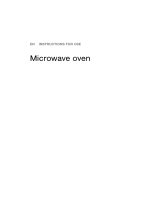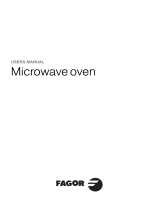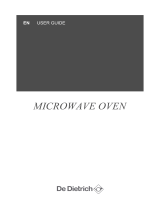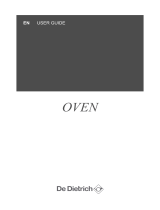26
EN 1/NOTICES TO THE USER
Important:
Keep this user guide with your
appliance. If the appliance is ever sold or
transferred to another person, ensure that
the new owner receives the user guide.
Please become familiar with these
recommendations before installing and
using your appliance. They were written for
your safety and the safety of others.
Your appliance is designed for standard
household use for cooking, reheating and
defrosting foods. The manufacturer declines
any responsibility in the case of inappropriate
use.
Ensure that the cookware is suitable for use
in a microwave oven.
To avoid damaging your appliance, never
operate it while empty or without the
turntable.
Do not interfere with the openings on the lock
on the front of the appliance; this could cause
damage to your appliance that would require
a service call.
The seal and frame of the door must be
regularly examined to ensure that they have
not deteriorated. If these areas are damaged,
discontinue use of the appliance and have a
specialised technician check it.
While heating food items in plastic or paper
containers, monitor the microwave’s contents
for there is a risk of spontaneous combustion.
For the microwave and microwave + fan
heating functions, the use of metallic
cookware, forks, spoons, knives or metal
staples or fasteners for frozen foods is not
recommended.
The contents of baby bottles and baby food
jars should be shaken or stirred and their
temperature checked before consumption to
avoid burns.
Never heat a baby bottle with the nipple on
(risk of explosion).
Do not allow children to use the microwave
oven without supervision, unless appropriate
instructions have been given so that the child
can use the oven safely and understands the
dangers of incorrect operation.
Always use oven mitts to remove dishes from
the oven. Some dishes absorb the heat of
foods and, therefore, are very hot.
Liquids and other foods should not be heated
in sealed containers because they may
explode.
It is recommended that you avoid heating
eggs in their shells and whole hard-boiled
eggs in the microwave oven because they run
the risk of explosion, even after cooking is
complete.
Heating beverages in the microwave oven can
cause sudden and/or delayed splattering of
boiling liquid, so precautions must be taken
when handling their containers.
In the case of small quantities (a sausage, a
croissant, etc.) place a glass of water next to
the food.
Excessive cooking times may dry out foods
and carbonise them. To avoid such incidents,
never use the same times recommended for
cooking in a traditional oven.
If smoke appears, stop or unplug the oven
and leave the door closed to smother any
flames that may appear.
•SAFETY RECOMMENDATIONS























